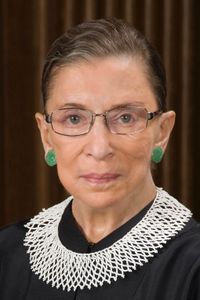Ruth Bader Ginsburg, a renowned American jurist, was brought into this world on March 15, 1933, in the bustling metropolis of Brooklyn, situated within the boundaries of New York City, in the state of New York, United States of America. She would go on to share her life with Martin D. Ginsburg, her loving spouse. Unfortunately, her remarkable journey came to an end on September 18, 2020, in the nation's capital, Washington, District of Columbia, United States of America.

Ruth Bader Ginsburg
Deceased · Born: Mar 15, 1933 · Died: Sep 18, 2020

































